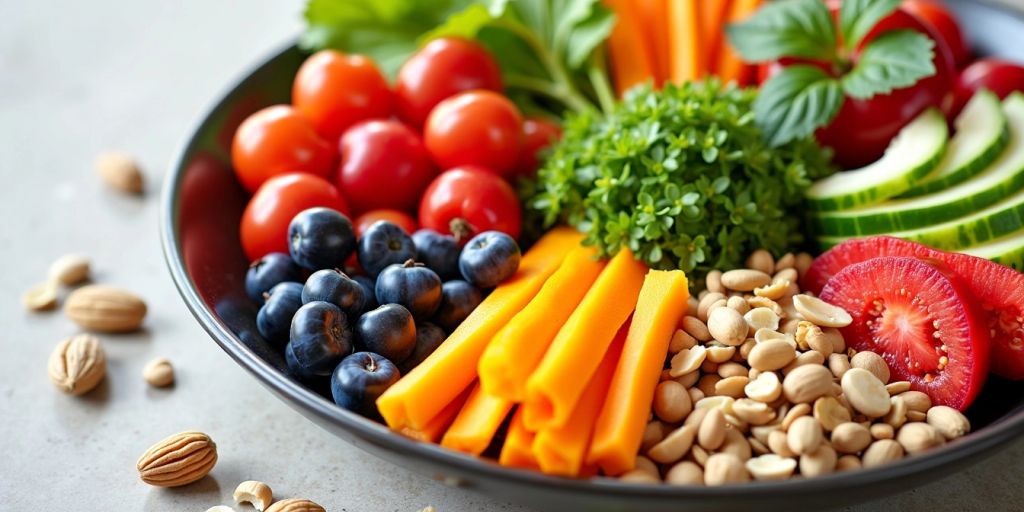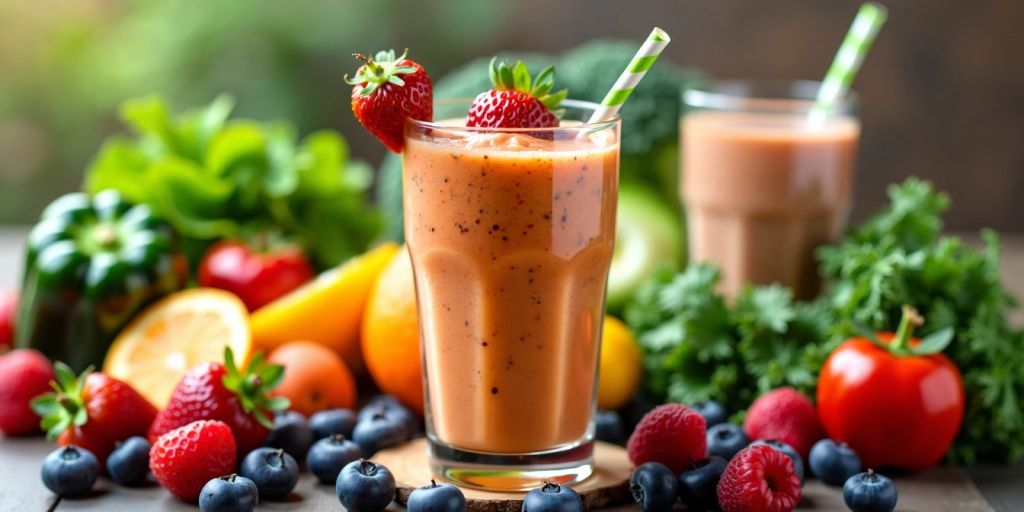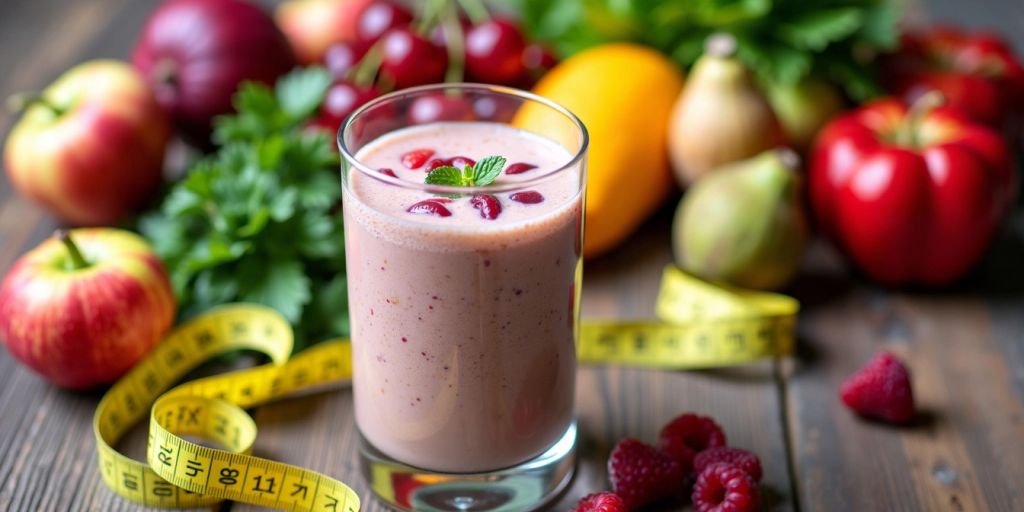Changing your eating habits can feel overwhelming, but it doesn’t have to be. Small, simple changes can make a big difference in your overall health and well-being. Here are ten easy diet hacks that can help you transform your eating habits and lead a healthier lifestyle.
Key Takeaways
- Starting your day with a protein-rich breakfast can keep you full and energized.
- Drinking water before meals helps control appetite and supports hydration.
- Adding more fiber to your diet can aid digestion and keep you satisfied longer.
- Using smaller plates can help you manage portion sizes and avoid overeating.
- Keeping a food diary can make you more aware of your eating habits and help you make better choices.
1. Start Your Day with a Protein-Packed Breakfast
Starting your day with a protein-packed breakfast can set the tone for healthier eating habits throughout the day. Protein is often called the king of nutrients because it helps you feel full and satisfied, reducing the urge to snack on unhealthy foods later.
Why Protein?
Protein affects your hunger and fullness hormones, making it the most filling of the macronutrients. A high-protein breakfast can decrease levels of ghrelin, the hunger hormone, more effectively than a high-carb meal. This means you’ll feel full longer and be less likely to overeat.
What to Eat?
Here are some great high-protein breakfast options:
- Eggs: Scrambled, boiled, or in an omelet, eggs are a fantastic source of protein.
- Greek Yogurt: Thicker and creamier than regular yogurt, it’s packed with protein and can be paired with fruits or nuts.
- Smoothies: Blend strawberries, peanut butter, vanilla protein powder, soy milk, chia seeds, and spinach for a delicious, protein-packed smoothie.
- Lean Meats: Turkey or chicken sausages can be a tasty addition to your breakfast.
- Nuts and Nut Butters: Add them to your oatmeal or spread on whole-grain toast.
Quick Tips
- Plan Ahead: Prepare your breakfast the night before if you’re short on time in the morning.
- Mix It Up: Keep your breakfast interesting by rotating different protein sources.
- Stay Hydrated: Drink a glass of water before eating to help with digestion and fullness.
A protein-packed breakfast can help you stay full and energized throughout the day, making it easier to stick to your healthy eating goals.
2. Drink Water Before Every Meal
Drinking water before each meal is a simple yet effective way to improve your eating habits. Water is crucial for many bodily functions, such as lubricating the joints and delivering oxygen throughout the body. By drinking a glass of water before you eat, you can help yourself feel fuller and avoid overeating.
Benefits of Drinking Water Before Meals
- Helps with portion control: Drinking water can make you feel full, so you might eat less during meals.
- Boosts metabolism: Staying hydrated can help your body burn calories more efficiently.
- Improves digestion: Water aids in breaking down food, making it easier for your body to absorb nutrients.
How to Make It a Habit
- Keep a water bottle handy: Always have a water bottle with you to remind yourself to drink before meals.
- Set reminders: Use your phone or a sticky note to remind you to drink water before you eat.
- Flavor your water: If plain water is too boring, add a slice of lemon or cucumber for a refreshing twist.
Drinking water before meals is a small change that can lead to big results. It’s an easy habit to adopt and can make a significant difference in your overall health and eating habits.
3. Incorporate More Fiber into Your Diet
Fiber is your friend when it comes to improving your eating habits. Foods high in fiber, like fruits, vegetables, and whole grains, help keep you full and satisfied. Aim for at least 25 grams of fiber each day to support your health and well-being.
Why Fiber Matters
Fiber is essential for a healthy digestive system. It helps regulate your bowel movements and can prevent constipation. Plus, a diet rich in fiber can lower your risk of heart disease and type 2 diabetes.
Easy Ways to Add Fiber
- Start your day with whole grains: Choose oatmeal or whole-grain cereals for breakfast.
- Snack on fruits and veggies: Keep apples, carrots, and other fiber-rich snacks handy.
- Add beans and legumes: Incorporate beans, lentils, and chickpeas into your meals.
- Opt for nuts and seeds: Sprinkle chia seeds or flaxseeds on your yogurt or salads.
High-Fiber Foods to Try
Here’s a quick list of high-fiber foods to add to your diet:
| Food | Fiber Content (per serving) |
|---|---|
| Lentils | 15.6 grams |
| Black beans | 15 grams |
| Chia seeds | 10 grams |
| Raspberries | 8 grams |
| Oats | 4 grams |
Remember, you can increase your intake of fiber-rich foods by eating more whole grains, fruits, and vegetables. Beans, nuts, and seeds are other great sources of fiber.
Incorporating more fiber into your diet doesn’t have to be hard. With a few simple changes, you can enjoy the benefits of a fiber-rich diet and feel better every day.
4. Use Smaller Plates
One simple trick to help you eat less is to use smaller plates. When you use a smaller plate, your portions look bigger, which can make you feel more satisfied with less food. This can help you control your portions and avoid overeating.
Why It Works
Using smaller plates can trick your brain into thinking you’re eating more than you actually are. This is because the same amount of food looks larger on a small plate than on a big one. This visual cue can help you feel full and satisfied with less food.
How to Get Started
- Swap out your large dinner plates for smaller ones.
- Use smaller bowls for snacks and desserts.
- Try using a salad plate for your main meals.
Benefits
- Helps with portion control
- Reduces the risk of overeating
- Can lead to weight loss over time
By making this small change, you can reduce your calorie intake without feeling deprived. It’s a simple yet effective way to manage your weight and improve your eating habits.
Remember, portion control can reduce overeating and lead to weight loss. Choose a small plate, drink a glass of water before your meal, and eat slowly.
5. Eat Mindfully and Slow Down
Eating mindfully means paying attention to what you’re eating and truly enjoying each bite. Eating quickly can lead to overeating because your body doesn’t have time to signal that it’s full. Take your time, chew your food thoroughly, and savor each bite. This can help you enjoy your meals more and reduce calorie intake.
Benefits of Eating Slowly
- Better Digestion: Chewing food thoroughly helps break it down, making it easier for your stomach to digest.
- Increased Satisfaction: When you eat slowly, you give your brain time to register fullness, which can help prevent overeating.
- Improved Weight Control: Studies show that slow eaters tend to consume fewer calories and have a lower body mass index (BMI).
Tips for Eating Mindfully
- Put Away Distractions: Turn off the TV and put your phone aside to focus on your meal.
- Take Smaller Bites: This makes it easier to chew thoroughly and enjoy the flavors.
- Savor the Flavor: Pay attention to the taste, texture, and aroma of your food.
- Listen to Your Body: Stop eating when you feel full, even if there’s food left on your plate.
Slowing down and being mindful of your eating habits can help you eat healthier and with more appreciation for your food.
6. Swap Sugary Drinks for Herbal Tea
Sugary drinks and sodas can sneak in a lot of empty calories into your diet. Instead, try swapping them out for herbal teas or flavored water with a slice of lemon or cucumber. These options are refreshing and calorie-free!
Benefits of Herbal Tea
- Reduces Sugar Intake: Herbal teas help you cut down on added sugar, which is linked to many health issues.
- Hydration: Staying hydrated is easier with tasty herbal teas.
- Variety: There are so many flavors to choose from, you’ll never get bored.
Easy Swaps
- Replace your morning juice with a cup of herbal tea.
- Instead of soda, have iced herbal tea with lunch.
- In the evening, unwind with a warm cup of chamomile tea.
Making small changes like swapping sugary drinks for herbal tea can have a big impact on your health. It’s a simple way to reduce your added sugar intake and enjoy a variety of flavors.
Quick Tips
- Always keep a pitcher of iced herbal tea in the fridge.
- Experiment with different flavors to find your favorites.
- Add fresh fruits or herbs for an extra kick.
7. Get Moving with Fun Activities
Exercise doesn’t have to be a chore. Find activities you enjoy, like dancing, hiking, or playing a sport. The more fun you have, the more likely you’ll stick with it. Aim for at least 150 minutes of moderate exercise per week.
Make It Social
Invite friends or family to join you. Exercising with others can make it more enjoyable and keep you motivated.
Mix It Up
Try different activities to keep things interesting. One day you could go for a bike ride, and the next, you could try a yoga class.
Set Small Goals
Start with small, achievable goals. This can help you build confidence and stay committed.
Remember, the best exercise is the one you enjoy and will do consistently.
Track Your Progress
Keep a log of your activities. Seeing your progress can be a great motivator to keep going.
8. Prioritize Sleep
Getting enough sleep is crucial for your overall health and well-being. Quality sleep can help regulate your appetite, making it easier to stick to your diet goals. When you’re well-rested, you’re less likely to crave unhealthy foods and more likely to have the energy to stay active.
Here are some tips to help you prioritize sleep:
- Set a consistent sleep schedule: Go to bed and wake up at the same time every day, even on weekends.
- Create a bedtime routine: Engage in relaxing activities like reading or taking a warm bath before bed.
- Limit screen time before bed: The blue light from screens can interfere with your sleep. Try to avoid screens at least an hour before bedtime.
- Make your sleep environment comfortable: Ensure your bedroom is dark, quiet, and cool.
Remember, getting enough sleep is just as important as diet and exercise when it comes to maintaining a healthy lifestyle. Aim for 7-8 hours of sleep each night to support your overall health and well-being.
9. Snack Smart
Snacking smart can make a big difference in your overall diet. Instead of reaching for chips or candy, choose healthy snacks like nuts, fruit, or yogurt. Preparing healthy snacks in advance can prevent you from making poor food choices when hunger strikes.
Healthy Snack Ideas
- Nuts and Seeds: These are great sources of healthy fats and protein. A small handful can keep you full and satisfied.
- Fresh Fruit: Opt for fresh berries instead of dried ones. Fresh berries are packed with nutrients and have less sugar.
- Greek Yogurt: Do the dairy! Light string cheese and nonfat Greek yogurt are amazing low-fat, high-protein snacks. Sweeten your yogurt yourself to avoid added sugars.
- Air-Popped Popcorn: This can be a satisfying, low-calorie snack. Just be sure to avoid prepackaged versions with added butter and preservatives.
Preparing your snacks ahead of time can help you stay on track and avoid unhealthy choices.
Tips for Smart Snacking
- Plan Ahead: Keep healthy snacks on hand so you’re not tempted by junk food.
- Portion Control: Use small containers to portion out snacks. This helps prevent overeating.
- Stay Hydrated: Sometimes thirst is mistaken for hunger. Drink water before reaching for a snack.
- Read Labels: Be mindful of hidden sugars and unhealthy fats in packaged snacks.
By making smarter snack choices, you can keep your energy levels up and avoid the pitfalls of unhealthy eating habits.
10. Keep a Food Diary
Keeping a food diary can be a game-changer for your eating habits. By tracking what you eat, you become more aware of your food choices and can spot areas for improvement. Use a journal or an app to log your meals and snacks. This makes it easier to stay on track with your weight loss goals.
The Benefits of Keeping a Food Diary
- Calorie Tracking: By documenting each meal, you can calculate your daily caloric intake to align with your weight loss goals.
- Meal Planning: Planning your meals becomes simpler when you know what you’ve been eating.
- Accountability: Writing down everything you eat makes you more accountable and less likely to indulge in unhealthy snacks.
Keeping a food diary is a simple yet effective way to transform your eating habits. Start today and see the difference it makes!
Conclusion
So there you have it, ten easy diet hacks that can truly transform your eating habits. Remember, small changes can lead to big results. Whether it’s swapping out sugary drinks for water or adding more veggies to your meals, every little bit helps. Stay positive, be patient with yourself, and celebrate your progress along the way. You’ve got this!
Frequently Asked Questions
Why should I start my day with a protein-packed breakfast?
A breakfast rich in protein helps keep you full longer and reduces cravings later in the day.
How does drinking water before meals help with eating habits?
Drinking water before meals can make you feel fuller, which can help you eat less.
What are the benefits of incorporating more fiber into my diet?
Fiber helps keep you full and aids in digestion, which can help you manage your weight better.
Why should I use smaller plates?
Smaller plates can help control portion sizes, making it easier to avoid overeating.
What is mindful eating?
Mindful eating means paying full attention to the experience of eating and drinking, both inside and outside the body.
Why should I swap sugary drinks for herbal tea?
Herbal tea has fewer calories and sugar, making it a healthier choice compared to sugary drinks.
How does exercise fit into eating habits?
Exercise helps burn calories and can improve your overall health, making it easier to stick to healthy eating habits.
What is the benefit of keeping a food diary?
A food diary helps you track what you eat, making you more aware of your eating habits and areas where you can improve.




